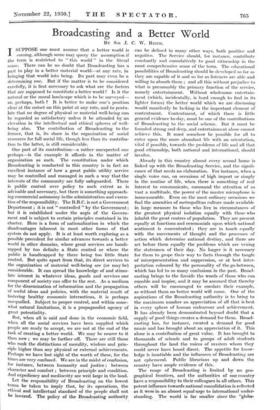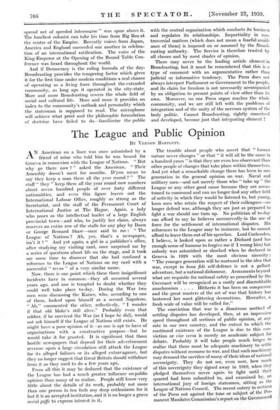Broadcasting and a Better World
BY SIR J. C. W. REITII.
ISUPPOSE one must assume that a better world is coming, although some may query the assumption if the term is restricted to "this world " in the literal sense. There can be no doubt that Broadcasting has a part to play in a better material world—at any rate, in bringing that world into being. Its part may even be a determining one. But if the matter is to be considered carefully, it is first necessary to ask what are the factors that are supposed to constitute a better world? Is it the natural or the moral landscape which is to be surveyed— or, perhaps, both ? It is better to make one's position clear at the outset on this point at any rate, and to postu- late that no degree of physical or material well-being can be regarded as satisfactory unless it be attended by an elevation in the intellectual and ethical spheres of well- being also. The contribution of Broadcasting to the former, that is, its share in the organization of social resources for full social life, though less than its contribu- tion to the latter, is still considerable.
One part of its contribution—a rather unexpected one perhaps—is the example it affords in the matter of organization as such. The constitution under which Broadcasting is conducted in this country is in fact an excellent instance of how a great public utility service may be controlled and managed in such a way that the interests of the community are fully safeguarded. There is public control over policy to such extent as is advisable and necessary, but there is something approach- ing commercial autonomy in the administration and execu- tion of the responsibility. The B.B.C. is not a Government Department ; it is not " controlled " by the Government; but it is established under the aegis of the Govern- ment and is subject to certain principles contained in its charter. Here is a form of nationalization in which the disadvantages inherent in most other forms of that system do not apply. It is at least worth exploring as a possible precedent for similar advances towards a better world in other domains, where great services are handi- capped by too definite a State control or where the public is handicapped by there being too little State control. But quite apart from that, its direct services to the organization of material well-being are (or may be) considerable. It can spread the knowledge of and stimu- late interest in whatever ideas, goods and services one component of society can offer to the rest. As a medium for the dissemination of information and the propagation of useful ideas and policies, with the material result of fostering healthy economic interactions, it is perhaps unequalled. Subject to proper control, and within some- what natural limitations, it is a propagandist agency of great potentiality.
But, when all is said and done in the economic field, when all the social services have been supplied which people are ready to accept, we are not at the end of the task of creating a better world. We may be nearer to it than now ; we may be further off. There are still those who rank the distinctions of morality, wisdom and prin- ciple higher than any physical or external achievements. Perhaps we have lost sight of the worth of these, for the times are very confused. We are in the midst of confusion, for instance, between humanity and justice ; between character and comfort ; between principle and condition. And eipediency and mediocrity are writ large in the land. Let the responsibility of Broadcasting on the lowest terms be taken to imply that, by its operations, the ethical and intellectual standard of the people shall not be lowered. The policy of the Broadcasting authority can be defined in many other ways, both positive and negative. The Service should, for instance, contribute constantly and cumulatively to good citizenship in the most comprehensive sense of the term. The educational possibilities of Broadcasting should be developed so far as they are capable of it and so far as listeners are able and willing to absorb them ; and all this without prejudice to what is presumably the primary function of the service, namely entertainment. Without wholesome entertain- ment (which, incidentally, is hard enough to find in its lighter forms) the better world which we are discussing would manifestly be lacking in the important element of contentment. Contentment, of which there is little general evidence to-day, must be one of the contributions of Broadcasting to the social scheme. But it must be founded strong and deep, and entertainment alone cannot achieve this. It must somehow be possible for all to enter upon the more abundant life with an orientation, vital if possible, towards the problems of life and all that good citizenship, both national and international, should involve.
Already in this country almost every second home is linked up with the Broadcasting Service, and the signifi- cance of that needs no elaboration. For instance, when a single voice can, on occasions of high import or simply in the routine of life, when there is something of real interest to communicate, command the attention of so vast a multitude, the power of the master microphone is immeasurable. Even on the most ordinary occasions we find the amenities of metropolitan culture made available in large measure to those who live in circumstances of the greatest physical isolation equally with those who inhabit the great centres of population. They are present equally at functions and ceremonials upon which national sentiment is concentrated ; they are in touch equally with the movements of thought and the processes of action which determine national destiny, and there are set before them equally the problems which are vexing the statesmen of their day. No longer is it necessary for them to grope their way to facts through the tangle of misrepresentation and suppression, or at best inter- pretation coloured by the personality of the go-between, which has led to so many confusions in the past. Broad- casting brings to the fireside the words of those who can ennoble and inspire, and it may be assumed that thereby others will be encouraged to emulate their example, as without them no better world will come. One of the aspirations of the Broadcasting authority is to bring to the maximum number an appreciation of all that is best in every sphere of human endeavour and achievement. It has already been demonstrated beyond doubt that a supply of good things creates a demand for them. Broad- casting has, for instance, created a demand for good music and has brought about an appreciation of it. This alone is a contribution of great value. It has brought to thousands of schools and to groups of adult students throughout the land the voices of masters whom they could never have heard direct. The appetite for know- ledge is insatiable and the influences of Broadcasting are not ephemeral. Public librarians up and down the country have ample evidence of this.
The range of Broadcasting is limited by no geo- graphical frontiers, and the authorities of one country have a responsibility to their colleagues in all others. This potent influence towards national consOlidation is reflected as it were in an almost equal urge to international under- standing. The world is far smaller since the "globe. spread net of speeded intercourse " was spun above it. The loneliest colonist can take his time from Big Ben at the centre of the Empire. Recently voices from Japan, America and England succeeded one another in celebra- tion of an international ratification. The voice of the King-Emperor at the Opening of the Round Table Con- ference was heard throughout the world.
And if Democracy is the ruling formula of the days Broadcasting provides the tempering factor which gives it for the first time under modern conditions a real chance of operating as a living force throughout the extended community, as long ago it operated in the city-state, More and more Broadcasting covers the whole-field of social and cultural life. More and more it provides an index to the community's outlook and personality which the statesman is supposed to read. The microphone will achieve what print and the philosophic formulation of doctrine have failed to do—familiarize the public
with the central organization which conducts its business and regulates its relationships. Impartiality in con- troversial matters (which does not mean a fearful avoid- ance of them) is imposed on or assumed by the Broad- casting authority. The Service is therefore trusted by all classes and by most shades of opinion.
There may never be the leading article element in Broadcasting, but it must be remembered that this is a -type of comment with an argumentative rather than judicial or informative tendency. The Press does not always interpret Parliament or Government to the people, and its claim for freedom is not necessarily accompanied by an obligation to present points of view other than its own. Moreover, no one Press organ reaches the whole community, and we are still left with the problems of integration and of the unity of the nervous system of the body politic. Cannot Broadcasting, rightly conceived and developed, become just that integrating element ?



















































































 Previous page
Previous page